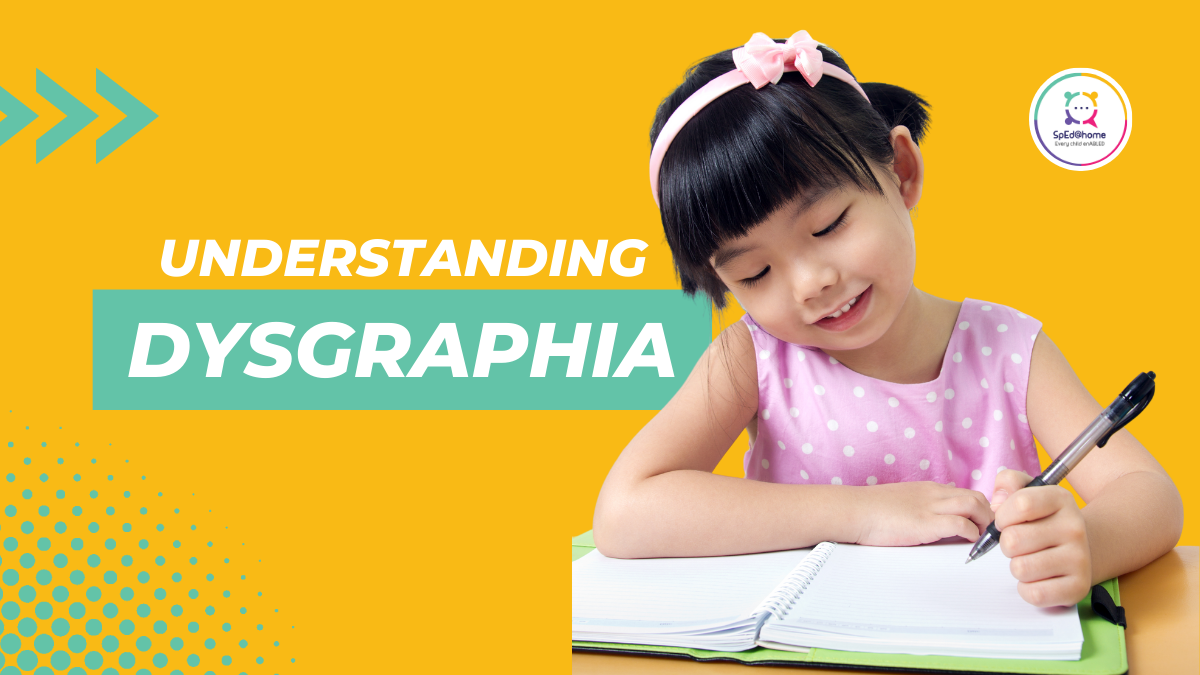Dysgraphia
Dysgraphia is a learning disability where children find it difficult to write properly, spell words and select the right words to use.
Symptoms of Dysgraphia
Different symptoms of Dysgraphia are seen in children of different ages. Some may have problems with handwriting while some may be facing issues with spelling. You can look for the following indicators or symptoms while your child is writing.
- Handwriting that is not legible
- Odd spellings
- Wrong capitalization
- A combination of cursive and print writing styles
- Using incorrect words
- Removing words from sentences
- Writing slowly
- Feeling tired after writing short sections
- Incorrect size of letters
- Inappropriate letter spacing
- Finding grammar and sentence structure difficult
- Uncommon position of the body or hands while writing
- Speaking words aloud while writing them down
- Looking at the hand while writing
- Tight pencil grip
- Tendency to avoid tasks involving writing or drawing
- Trouble taking notes at school
Types of Dysgraphia
Motor Dysgraphia:
Children with Motor Dysgraphia have weak motor skills, coupled with weak dexterity.
Spatial Dysgraphia:
This learning disability refers to the trouble with spatial awareness. Children with spatial dysgraphia find it difficult to judge space between lines and use the right amount of space between words. Any written form of content from them is usually not legible.
Phonological Dysgraphia:
In this learning disability, children experience difficulty in writing and spelling, especially with unfamiliar, jumbled, and phonetically irregular words. Children with Phonological Dysgraphia find it hard to retain similar sounding words in memory and put them in the right sequence to produce the target word.
Lexical Dysgraphia:
Lexical Dysgraphia is seen when a child can spell but uses standard phonemes (distinct units of sound that differentiate words from each other) with mistakes in irregular words.
Occupational Therapy for Dysgraphia
Diagnosis
As parents, you may need many specialists, including a family doctor or pediatrician, an occupational therapist, and a psychologist to diagnose dysgraphia in your child.
A doctor will have to rule out other conditions that could cause writing problems for your child. Once this is done, a psychologist who specializes in learning disorders can diagnose dysgraphia.
Tests include:
- Academic Tests
- Fine Motor Skill Trials
- IQ Tests
- Writing tests
During these tests, the specialist observes the person’s pencil grip, hand and body position, and writing process. They also examine the finished parts for signs of dysgraphia, in your child.
The American Psychiatric Association’s Diagnostic and Statistical Manual of Mental Disorders ( DSM ) criteria for diagnosing specific learning disorders, such as Dysgraphia is that the set of symptoms should be present for at least six months, while the right interventions are in place.
There is no cure for Dysgraphia, but you can learn to handle your children’s symptoms to make school and lifeless challenging for them.
Occupational therapy
Your children can learn specific skills and techniques to make writing easier and can improve their fine motor skills and may relearn how to hold a pen or pencil to enable better writing.
Strategies relating to classroom tools:
- Try different writing tools and grips e.g. pens, pencils
- Make your children write on paper with raised lines to help them stay within the lines
- Let them read from printed lesson outlines in class to ease note-taking
Strategies for directing children in school
The way your child’s teacher delivers a lesson or introduces an assignment can impact his/ her comprehension and results. As a parent you can make their teachers aware of the following methods:
- Allowing ample time to complete assignments
- Filling in the name, date, and title of assignments beforehand
- Elaborating how each element is graded
- Sharing earlier assignments and grades
- Giving solutions to written assignments
Strategies for finishing projects:
Your child can use technology and support systems to complete assignments using:
- Dictation software while writing
- Requesting for a proofreader to check work
- Typing assignments on a computer
- Asking for extra time for tests
Dysgraphia and mental health
Learning disabilities can cause the following problems for a child:
- Fears
- Worry
- Sleep issues
- Irritation
- Feelings of sadness or hopelessness
- Social withdrawal
- Loss of appetite
- Thoughts of self-harm
If you see these signs, get in touch with us and talk to our experts. And remember, your child’s journey of improvement and development starts with your decision.












